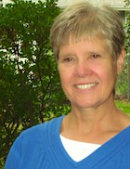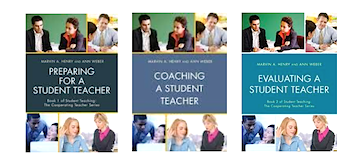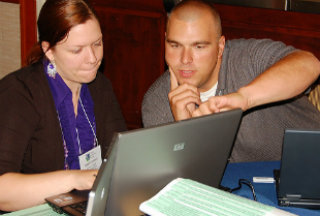How to Succeed as a Cooperating Teacher
 By Ann Weber
By Ann Weber
Your principal approaches you to request that a new student be placed in your classroom. What’s the hesitation? This time the principal is not referring to a new middle-level student but rather a middle-level student teacher.
How can you possibly wring another ounce of time, energy, and space to include a budding professional in your career world? You pause. Then again, you ask yourself, how can you not?
How can you not want to share the sense of achievement that arises from meeting teaching-learning challenges and the satisfaction that comes from working with middle grades kids? How can you not want to pass the torch onto a future teacher?

So you say “Yes” to your principal and bask for a full 39 seconds in the rapture of the outstanding contribution you will ultimately make to the next generation of teachers. You imagine the luxury of an extra professional in your classroom and the potential rejuvenation that a college-adult might bring in terms of ideas and energy.
All this sounds grand. Again, you momentarily pause, then let out a muffled, “Yikes!” and retreat to your empty classroom as you contemplate the full weight of being a cooperating teacher.
You can do this
Take a deep breath. You. Can. Do. This. It has to be less difficult than coordinating four different lab experiments in one 50-minute class period, planning a successful class field trip which includes a bus breakdown plus two nauseous students, or negotiating usage of the media lab among eight teachers!
After all, you are a middle-level teacher. You can do anything, including becoming an effective sage for the field of teaching.
You’ll need to do some upfront work to build a skill set that will make this a successful experience for the student teacher, your middle-level pupils, and you. In your role as cooperating teacher, you will need to implement not only model, teaching competencies but also key supervisory skills.
You already know how to teach well so you simply need a quick study of supervisory skills appropriate for the student teaching phase. What words and actions will transition that college-aged adult into a professional teacher? Let’s see.
It’s not just about “how to teach”

You are nurturing a professional decision maker, a reflective practitioner, a super-human being with magical powers.
Well, maybe not that last one – but perhaps pretty close!
While every student teacher and every student teaching experience is unique, there are three areas of supervisory skills a cooperating teacher can learn that will increase your chance for success: preparation, coaching, and evaluation.
Prepare in advance, then activate
To prepare for the arrival of your student teacher, you ready your physical classroom to accommodate another teacher and gather the core policy and procedure information needed for this person in this new situation. You develop a teaching and non-teaching itinerary, outlining the activities that will take the student teacher from observer to independent educator. And then, when they arrive, you introduce your student teacher to the school community and activate the plan.
With deliberate attention to your preparation details – including gathering knowledge about the teacher education program they’ve been experiencing – you and your student teacher will have an environment and guide for the whole experience. Your preparation prior to the beginning of the experience helps maintain the professional development of the student teacher through the busyness of school days that you know so well (and they may not!).
For example, Matthew learned that by providing his student teacher with a weekly chart of responsibilities at the beginning of the experience, his student teacher never had a conflict with school responsibilities because she made notations in her personal planner aimed at budgeting her time wisely. She also asked good questions and observed more closely because she knew what her next responsibility would be.
Another example is Charlene who learned to proactively discuss the school board’s policies for teachers in her conservative community. Her student teacher made sure her tattoos were covered and knew to turn off her cell phone throughout the school day. These situations did not have to be tactfully addressed later and the time was better spent on other topics.
Sharpen your coaching skills

Learning how to unobtrusively collect data, learning what communication methods work for your student teacher, and learning how to monitor change are important aspects of the cooperating teacher role. As you activate these skills, your student teacher can climb to higher ranges of competencies.
Karen learned to maximize the value of regular goal-oriented conferences by analyzing data collected from observations with her student teacher. Anticipating these supportive meetings became the motivation for her student teacher to improve. Karen let the data speak, which assured her that she was being objective too. Soon her student teacher took the lead in setting his professional goals.
Another cooperating teacher, BJ, learned strategies to help him identify his student teacher’s commitment level and knowledge of appropriate professional ideas, resources, and skills. Knowing these levels allowed him to tailor his approach with each particular student teacher in each particular situation and communicate successfully.
Anticipate the need for evaluation

These evaluations represent the end product. What has the student teacher become? What has the student teacher accomplished to demonstrate the level of competency?
Throughout the experience, Anton kept copies of written feedback and evidence of growth, based on goals developed (and regularly reviewed) with his student teacher. He found these to be helpful reminders when the time came for a summative evaluation.
When it was time for Laura to write the letter of recommendation for her most recent student teacher, she had prepared herself to use concise, accurate language on topics of importance, avoiding her former tendency to rely on flowery wording that provided little factual impact.
Accept the Challenge!
It is an honor to be chosen as a cooperating teacher but not a role to be taken lightly. Professional development in the areas of preparation, coaching, and evaluation will strengthen your ability to be an effective, professional leader with a student teacher. As a skilled supervisor, you can better prepare the student teacher plus you also contribute in a very special way to the teacher education continuum, the teaching profession, and the schooling of our youth.
Maybe your principal will ask. Maybe a middle-level education major will approach you with a request. Maybe you will inquire at a teacher education institute. Whatever the circumstance, consider accepting the role of cooperating teacher and giving forward to your profession.
Finally, whether you are a new or experienced , seek the opportunity to expand those supervisory skills most helpful in guiding your student teacher so that you can truly say “Yes!” with confidence.

Ann is co-author of Student Teaching: The Cooperating Teacher Series (3 professional development books) and Supervising Student Teachers the Professional Way, 7th edition. Combined, she and co-author Marvin Henry have over five decades of experience in teacher education.



































